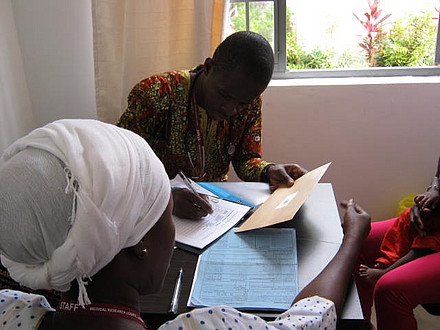Study shows vaccination during pregnancy could prevent RSV illness in infants
Respiratory Syncytial Virus (RSV) is a global pathogen that can cause severe respiratory tract illness. RSV infections can be especially dangerous for newborns and infants in general. A large-scale international vaccination study involving Charité – Universitätsmedizin Berlin and the London School of Hygiene and Tropical Medicine has now investigated the efficacy of an initial vaccine candidate. Participants were given the vaccine during pregnancy. As the researchers describe in The New England Journal of Medicine*, up to 81 percent of the participants’ children were reliably protected against severe illness during the first six months of life.
It is estimated that about 50 to 70 percent of children in Germany contract RSV in the first year of life, and nearly every child will have been infected at least once before reaching two years of age. Illness generally starts with mild cold-like symptoms before progressing to the lower respiratory tract and lungs. The disease can cause acute breathing problems and shortness of breath. Around the world, some 100,000 children under the age of five years died as a result of RSV infection in 2019, about 97 percent of them in low- and middle-income countries.
“Previously, only symptomatic treatment was available for RSV. In severe cases, supplemental oxygen is vital, but in poorer countries, it is often not administered fast enough or to an adequate extent,” says Dr. Beate Kampmann, head of the Institute of International Health at Charité and Einstein Professor for Global Health. “This means we urgently need an vaccine to provide effective protection against RSV severe disease for the most vulnerable group, namely children under six months old.”
One promising option is vaccination during pregnancy, which is already recommended for diseases such as the flu, whooping cough, and COVID-19. Expectant mothers generate antibodies after receiving the vaccine and then pass them along to the unborn child through the placenta. The baby is born with effective immune defenses that persist through the first few months of life.
Extensive vaccination study in 18 countries
Now, a pharmaceutical company has developed this kind of vaccine to be administered during pregnancy, targeting RSV. The new vaccine, called RSV-preF, was the subject of an extensive international study performed in 18 countries between 2020 and 2022, which investigated its tolerability and efficacy. Kampmann played an instrumental role in the study as part of her longstanding research work within the vaccines and immunity theme with the Medical Research Council (MRC) Unit The Gambia, part of the London School of Hygiene and Tropical Medicine (LSHTM).
In the phase 3 trial that has now been published, the vaccine was administered to 3,682 randomly selected participants during the second or third trimester of pregnancy as a shot in the upper arm. A similarly sized comparison group received a placebo shot containing no vaccine. Neither the participants nor the heads of the study knew at any time up to the conclusion of the trial who had received the vaccine and who had been given the placebo. That makes it a placebo-controlled randomized double-blind trial, which is aligned with the very highest standards of quality.
The children were examined regularly and upon any signs of respiratory illness for one to two years after birth. They were also tested for RSV, and the severity of illness was assessed according to a predefined scale used for the study.
Approval for RSV vaccine sought
“The results of the vaccine trial are extremely positive,” Kampmann says. “In over 80 percent of children, maternal immunization during pregnancy prevented severe RSV disease in the first three months of life, and over two-thirds were still protected at six months of age. The vaccine was also very well tolerated.” The maker of the vaccine has applied to the European and U.S. drug authorities for approval. Results of the review are expected later this year.
Nearly half of the study’s participants came from the United States, while 30 percent live in low- or middle-income countries. Kampmann’s team recruited about 200 participants in Gambia, for example. “We were able to use the platform for vaccine trials involving pregnant women that we had already established in Gambia for the RSV vaccine study as well,” she says. Kampmann, a proven expert in childhood infectious disease, has been working in the West African country for more than a decade now. Her activities have included initiating a program for immunization during pregnancy to combat whooping cough (pertussis) during childhood. The goal is to prevent these kinds of diseases and lower infant mortality rates.
“It’s important to perform vaccine trials in the countries where the vaccines are to be used later on,” Kampmann says. “Especially in socioeconomically disadvantaged countries, people often suffer from chronic gastrointestinal conditions due to poor hygiene conditions. That can lower the effectiveness of vaccination, as in the case of the rotavirus vaccine. And there are comorbidities such as malaria and HIV that impair the transfer of antibodies through the placenta. All these factors affect how well a vaccine works in the end.” When it comes to national vaccination bodies, it is also important for a vaccine to have proven effective within that region so it can be recommended later on.
“The RSV vaccine was tolerated extremely well overall by the participants, and its effectiveness in preventing severe RSV disease in infants was persuasive. We’d like to thank all the women who participated in the study, and we hope the vaccine will be in use soon, saving many young lives.” That applies to children in Gambia and around the world, since the 2022/23 season that just concluded highlighted the consequences of RSV infections. In Germany alone, intensive care admissions among infants and toddlers increased by as much as 350 percent, according to the Robert Koch Institute, Germany’s federal public health agency. The situation pushed healthcare systems to their limits at times.

